Speakers (2024)
(In alphabetical order) - continuously updated
Marie Blank
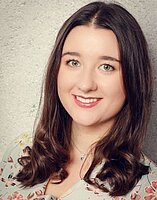
Marie Blank is a master’s student in Global Studies at the University of Graz, Austria, and was a participant in the SOPHEA Summer School last year. She wants to raise awareness that our health depends on the health of our planet and uses her experience from her B.A. in Business Studies, her international work experience and her volunteering in various sustainability activist groups to advocate for Planetary Health. In her field of expertise, she deals with the economic and social aspects of Planetary Health, which she addresses in her master's thesis about the Planetary Health Diet and Consumer Behaviour. Marie works for the German Climate Change and Health Alliance (KLUG e.V.) as a working student in the area of communication and public relations where she advocates for a healthier planet.
Vanessa de Oliveira Andreotti

Dr. Vanessa de Oliveira Andreotti is the Dean of the Faculty of Education at the University of Victoria. She is a former Canada Research Chair in Race, Inequalities and Global Change and a former David Lam Chair in Critical Multicultural Education. Vanessa has more than 100 published articles and has worked extensively across sectors internationally in areas of education related to global justice, global citizenship, critical literacies, Indigenous knowledge systems and the climate and nature emergency. Vanessa is the author of Hospicing Modernity: Facing humanity's wrongs and the implications for social activism, one of the founders of the Gesturing Towards Decolonial Futures Arts/Research Collective and one of the designers of the course Facing Human Wrongs: Climate Complexity and Relational Accountability, available at UVic through Continuing Studies.
Roos Derks
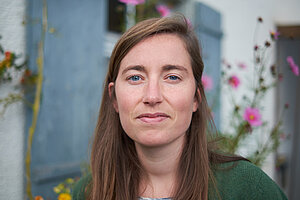
Roos Derks could be called an applied regenerative culture researcher and practitioner. She completed a masters degree in Cultural Sociology after which she decided to steer away from the worlds of words and theory, and move into applied regenerative action. This took her to study and experiment with ethical design and develop regenerative projects since 2015. She ran an independent cultural and political centre for some years, learned about self-reliance and initiated a yearly co-created skill sharing gathering, the Dragon Seed Camp. She is currently leading a permaculture garden in the Ecovillage where she lives in Switserland, here she is teaching permaculture design and hosting courses on Regenerative Culture. She has guided project groups at the yearly Ecovillage Design Education in Schloss Glarisegg, CH since 2019, where she merges her study of Permaculture, Design Justice and her experience with co-creation, emergence and working with complexity. Her biggest inspiration is the beauty of nature, and the beneficial role human beings can play in that, exemplified by indigenous people all over earth.
Catrin Gersdorf
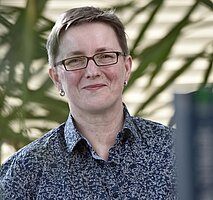
Catrin Gersdorf is Professor of American Studies at the University of Würzburg, and the Speaker of the Environmental Humanities class at the Graduate School for the Humanities. She is the author of The Poetics and Politics of the Desert: Landscape and the Construction of America (2009). Her published work includes essays and edited volumes on landscape and literature, the intersection of ecology and (American) democracy, the literary and cultural history of forests and gardens, and on individual writers, thinkers, and artists such as Thomas Jefferson, Henry David Thoreau, Walter Benjamin, Willa Cather, Nathanael West, Angela Carter, Ana Mendieta, Toni Morrison, and Annie Proulx. Her current research focuses on literary and cultural responses to the challenges of the Anthropocene.
Caroline Muthoni Gichukui
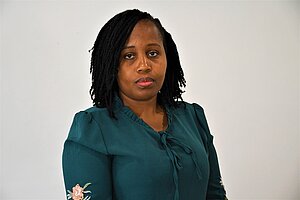
Caroline Muthoni holds a BSc in Community Resource Management and is currently pursuing her Masters in Global Health at the Liverpool School of Tropical Medicine. She works as a Project Coordinator at the Institute for Human Development, Aga Khan University working on climate change and health related projects. Her most recent project was the Enhancing Belmont Research Action to support EU policy making on climate change and health (ENBEL) project where she was part setting up the Climate Health African Network for Collaboration and Engagement (CHANCE). She currently sits in the CHANCE steering committee together with partners from other organizations. Her work revolves around supporting evidence-based climate and health policy making; building networks for collaboration among stakeholders in Africa; and facilitating climate and health knowledge exchange and learning. She also has extensive experience managing projects and coordinating different research studies including qualitative inquiries, cross-sectional studies and RCTs on HIV/AIDS, social justice, WASH, urban development, sexual reproductive health & rights and nutrition.
Martha Groth
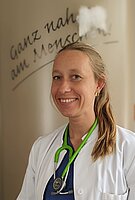
Dr. med. Martha Groth studied human medicine in Aachen and worked in regional hospitals as a specialist in internal medicine. She is currently working at the Luisenhospital in Aachen. Here she has been additionally responsible for the sustainability area with a focus on ecological sustainability for the past three years. She has been a certified CSR manager since July 2024.
Martha Groth is a member of Health for Future and "Deutsche Allianz für Klimawandel und Gesundheit". She is also a sustainability ambassador at ZUKE Green.
Samira Jabakhanji
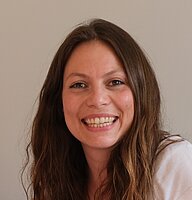
Dr. Samira Jabakhanji is a postdoctoral researcher in the Department of Public Health, Social and Preventive Medicine at the Mannheim Institute of Public Health at Heidelberg University, and in the School of Population Health at the Royal College of Surgeons in Ireland University of Medicine and Health Sciences. Samira holds a BSc degree in European Public Health and MSc in Healthcare Policy, Innovation and Management from Maastricht University, and PhD in epidemiology from RCSI University of Medicine and Health Sciences.
Samira’s main fields of expertise are planetary health, sustainable healthcare, and early childhood obesity. Additionally, Samira has conducted research in the areas of cross-border emergency care, quality improvement in healthcare, chronic care delivery in low- and middle-income countries, cost analysis of healthcare interventions, and health inequalities. While working in health economic research, Samira has co-founded and is now chairing the Obesity Cobweb network (COllaBoration in health economic modelling of overWEight and oBesity).
Mascha Kaddori
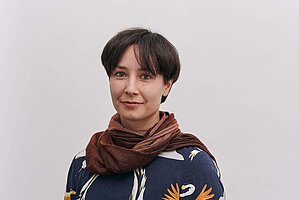
Mascha Kaddori is a dedicated intensive care nurse and veterinarian from Germany with experience in both healthcare fields - human medicine and veterinary medicine. She gained extensive work experience in various intensive care units in the human health sector, before joining GIZ (Gesellschaft für Internationale Zusammenarbeit) in the global project International Alliance against Health Risks in Wildlife Trade. Currently she is the Policy Adivosr for One Health and Scientific Affairs at Vétérinaires Sans Frontières Germany/Veterinarians Without Borders (VSFG) in Berlin. The organization's humanitarian aid and development cooperation is aimed equally at animals, the environment and people in the Horn of Africa, with a focus on pastoralist communities. Mascha‘s expertise spans across One Health, Intensive Care, End-of-life Care, Veterinary Public Health, and Zoonosis, reflecting her commitment to addressing complex health challenges in both human and non-human animal populations.
In addition to her professional career, Mascha Kaddori is active in numerous voluntary projects, including running the DareToCare Animal Welfare Podcast, managing director of the German Veterinary Student Association and Co-founder of the Health Matters webinar series, which aims to bring medical and veterinary students closer together. She is passionate about linking human, non-human animal and environmental health and welfare, as well as creating an interdisciplinary exchange and collaboration.
Fatoumatta Kassama

Fatoumatta Kassama has 11 years of experience in Nursing. She is the founder and CEO of Girls’ Pride based in The Gambia, an organization that promotes gender equality, provides eco-friendly and reusable sanitary pads for women and girls and teaches them the importance of using reusable sanitary products as positive climate mitigation actions that can reduce their carbon footprints, prevent blockage of sewage systems, protect our environment and water bodies from plastic waste and humans from air pollution.
Ms. Kassama is a Mandela Washington Fellow, One Young World Ambassador and Delegate Speaker, Opec Funds for International Development (OFID) Scholar & OFID young leaders award winner, Obama Foundation Leader, African Presidential Leadership Program Alumnus, World Youth Forum Delegate, Tony Elumelu Entrepreneur, Youth Excellence Award winner, Friends4SDGs Ambassador, Because Accelerator Entrepreneur, Change Now summit delegate, World Health Summit delegate, International Sustainability Academy fellow, and the former Acting president and vice president of the National Association of Gambian Nurses and Midwives.
Fatoumatta currently works for the Society for the Study of Women's Health (SSWH) as the Co-Principal Investigator for a 3-year implementation research project titled 'Shifting Gender Norms for Improved Maternal and Adolescent Health in The Gambia' funded by IDRC.
Katharina Kewitz
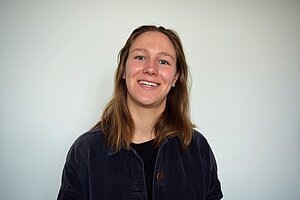
Katharina has just finished her medical studies at the University of Lübeck, Germany and has been active in the climate justice movement in various projects for the last years. By doing so, she had the opportunity to learn a lot, work with wonderful activists from all over the world to organize protest and advocate for climate justice and planetary health. She is passionate about linking environmental and social justice and has been focusing on organizing methods, public narratives and campaign strategies. For the last year, she spent a lot of time working with public transport employees in a campaign that brought together workers and climate activists, showing that we can achieve much more when we come together, realize common goals and take the time and effort to build a movement from the base. Having participated in the Summer School last year, she is really looking forward to experiencing the energy and motivation in Würzburg again.
Muna Khalil
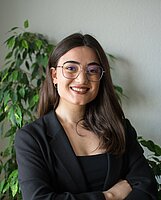
Muna Khalil is a certified pharmacist, biomedical scientist and environmental activist. After obtaining her pharmacy degree from her hometown, Damascus, she moved to Germany to pursue her master’s degree in Biomedical Sciences. This advanced education not only honed her expertise and deepened her understanding of the intricate relationship between healthcare and science but also made her acutely aware of the resource wastage in daily research activities and the healthcare sector. This awareness motivated her to obtain the German Approbation as a pharmacist and join Pharmacists for Future.
Pharmacists for Future (Ph4F) is an initiative committed to promoting sustainability within the pharmacy and broader health sector. her role with Ph4F has allowed her to merge her professional skills with her commitment to environmental stewardship. She is passionate about driving change and fostering practices that ensure the health of both our patients and our planet.
She currently works in a public pharmacy in direct contact with patients, and her work shows her every day the critical need for integrating sustainable practices into our healthcare systems. From advocating for green pharmacy practices to reducing waste and encouraging the use of eco-friendly materials and substances, she is dedicated to making a positive impact.
Michael Knipper

Prof. Dr. Michael Knipper is a physician, medical historian and anthropologist, trained in Germany (University of Bonn) and Spain (University of Oviedo). He did clinical work in pediatrics, tropical medicine and primary health care in Germany (1996-97, 2000-2001) and Ecuador (1997-1999).
In his research, he is interested in the history and current dynamics related to social medicine and human rights-based approaches to health, with particular attention to traditional medicine and intercultural health with indigenous communities in Latin America (Ecuador), as well as migration and health. His focus is on the social, cultural, legal and political determinants of migrants’ health, mental health and tuberculosis. In teaching, Knipper draws attention on a historically and anthropologically grounded perspective on the social, cultural and ethical dimensions of health, with particular focus on intercultural health, internationalization and migration. He served as consultant on migration and health for WHO, IOM and Doctors of the World, and was member of the UCL-Lancet-Commission on Migration and Health (2018). Currently, he is coordinating the Latin American Regional Hub of Lancet Migration: Global collaboration to advance migration and health (www.migrationandhealth.org).
Anja Lehnertz

Anja Lehnertz - Hemberger (M.A., B.Sc) is a nurse and midwife (since 2000). She is working as a community midwife and is employed in a clinic. Her work has been made into several films. She is a visionary, author and activist. She wrote her master's thesis at the HWG Ludwigshafen on the environmental awareness of midwifery students in Germany. She is currently working as a midwife in the Frauenhofer Institute's Ecological Sustainability in Healthcare project. She is a member of "Midwives4Future" and the interdisciplinary working group "KLUG AG Rund um die Geburt" within the German Alliance on Climate Change and Health (KLUG), Mother Hood e.V. and BVKSG e.V. She has been climate-fit certified since 2023 and is a climate activist in her home community of Waldbronn.
Johanna Lieberth

Johanna Lieberth is a medical student in her fifth year in Wuerzburg and is participating in a supplementary study group on global and planetary health. She is an active member of the local Health for Future group since 2020 and since 2021 of the newly founded PAN (Physician Association of Nutrition) University group here in Wuerzburg. The groups work on several projects such as a plant-based week in the student cafeteria, more sustainability in the regional hospitals, and more knowledge about the health risks of climate change for health workers and the population as a whole. Johanna has given various lectures about Climate Change and health and nutrition in times of climate change.
Amneh Masoud
Amneh Masoud (she/her) is a medical doctor, mediator and currently research associate at the Institute for General Medicine at the University Hospital of Würzburg, where she coordinates the trilateral SOPHEA project (Strengthening One and Planetary Health in Eastern Africa) under the lead of Dr. med. Schwienhorst-Stich.
Amneh has been involved in climate justice movements over the past ten years in various projects, that have led her from coal mines in Germany to monoculture deserts in southern Spain, to the reality of EU-borders in Serbia, where has worked with people on the move in different settings. She seeks to build bridges between different movements and professions, finding common ground to take responsabilty for the crises we created.
Learning about the power of regenerative (agri-)cultural practices and the power of community as antidots to exploitation and seperation are her source of inspiration.
Mirna al Masri
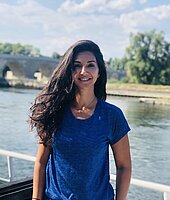
Mirna al Masri is a research assistant at the Chair of Planetary & Public Health at the University of Bayreuth. She holds a Bachelor of Science in Nutrition and Dietetics and has over a decade of experience in health promotion. Seeking a global, interdisciplinary perspective, Mirna pursued a Master's in Global Food, Nutrition, and Health at the University of Bayreuth. Her thesis examined cultural impacts on sustainability knowledge and eating behaviors, earning two awards for its significance in sustainable development.
Mirna's work continues to focus on sustainability and planetary health, contributing effectively to the field through both her research and the "UBT Green Talks" series. This series aims to enhance awareness about the interconnectedness of the environment, climate change, and human health. The concept for “UBT Green Talks” originated during the Planetary Health Summer School in September 2023, and she is eager to share her experience with this year’s participants!
Given Moonga

Given Moonga is completing his PhD in International Health- Medical Research at the Ludwig- Maximilians-Universität, Centre for International Health (CIH-LMU) München Germany. His holds a Masters of Epidemiology from the University of Zambia.
He is a research fellow at the Institute and Clinic for Occupational-, Social- and Environmental Medicine, LMU University Hospital, Munich, Germany. Currently he is working on topics of Planetary Health, Climate change and Nutrition, eHealth (Digitalization of health care), Spatial Epidemiology, especially modelling of exposure pathways. He has special interest in developing analytical methodologies to address inequalities, especially in nutrition. Given is also a lecturer/Researcher in the department of Epidemiology and Biostatistics, at the University of Zambia and a founding member of the Planetary Health Eastern Africa Hub | PHEAH.
Melvine Otieno

Melvine is an Environmental Health scientist and founder of Planetary Health Eastern Africa Hub.She has worked closely with KLUG- German Alliance Climate Change and Health in Climate Change and Health/Planetary Health Leadership online course-Transformational and transdisciplinary.She attained a BSc in Environmental Biology and Health and MSc in Environmental Health at the University of Eldoret. Since 2020-2022, Melvine Otieno has served as a Next Generation Network Fellow of the Planetary Health Alliance, working to inspire, activate and convene the next generation of Planetary Health Campus Ambassadors from around the world, as well as conduct outreach to facilitate local and international collaborations. She is an Associate team member of Women Leaders for Planetary Health (WLPH) where she advocates for gender equality for sound environment and public health solutions. She is also an active member of inVIVO Planetary Health, Society for Environmental Geochemistry and Health (SEGH), Royal Society of Chemistry (RSC), Africa Network for Internationalization of Higher Education (ANIE), International Alliance against Health Risks in Wildlife Trade (GIZ), Climate and Health Africa Network for Collaboration and Engagement (CHANCE Network) and Global Health Hub Germany. As an Early Career Researcher, Melvine has worked on several internationally funded projects as Research Assistant for Newton Utafiti fund on Aquaculture (2018-2019) and BGS-UoE-MU research on dynamics of Environmental Geochemistry and Health in the Lake Victoria Basin (2020-2022) and recently as a Co-Investigator on the GCRF QR Time Urgency Grant, to investigate the role of wet markets and backyard livestock in supporting nutrition of preschool-aged children in Kenya: challenges from COVID-19 influenced closure. At University of Eldoret, she is the project coordinator of ‘Strengthening One Health and Planetary Health in Eastern Africa’ (SOPHEA) project, funded by DAAD in partnership with Würzburg University and Catholic University for Health and Allied Sciences (CUHAS) in Tanzania.Presently, she collaborates with local, regional and international partners and she aspires to continuously participates with both the local and global community in building Planetary Health and One Health concepts to find solutions to environmental health challenges and imbalances.
Janeth Peter
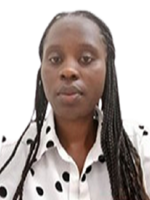
Janeth Atieno Peter (BA, MA) is an Assistant Lecturer at the School of Public Health at the Catholic University of Health and Allied Sciences. With a background in social Sciences. She brings a unique perspective to her role, particularly in understanding the complex interactions that exist between Planetary Health social dynamics and Public Health. Janeth has a strong desire to investigate how, in the context of East Africa, human health and planetary well-being is related.
Janeth recognizes that social and cultural activities have a big impact on human health, which is why she is so interested in Planetary Health as well as socio-cultural determinants of health. She believes that addressing Environmental challenges requires a holistic approach that integrates social, cultural, and ecological perspectives.
In her teaching role, Janeth strives to inspire the next generation of public health professionals to consider the broader implications of their work on both human populations and the planet. Through her commitment to strengthening One Health initiatives in East Africa, she aims to foster collaboration across disciplines and promote sustainable solutions for a healthier future.
Michaela Primbs

Michaela completed a Bachelor of Science in Organic Agriculture at the University of Kassel. During her studies she helped to build up the seminar programme and manage the agriculture at her family´s farm Lindenhof Hemmersheim. In her bachelor thesis she examined possibilities of communication media and learning events to raise soil awareness. After her studies she worked on the farm, planted an agroforestry system and built up a permaculture garden. 2021 she moved to Freising for her Master studies in Climate Change Management at the University of Applied Sciences Weihenstephan-Triesdorf. In this international study programme she learns practice-oriented solutions in climate change mitigation and adaptation in agriculture, peatlands, forests and renewable energies. In the last years Michaela extended her knowledge about agroforestry. She is participant of the first comprehensive advanced training programme for agroforestry consultants in Germany and part of the German-wide network of agroforestry planners and practitioners (DeFAF e.V.).
Psychologists4Future: Julia Walden & Paula X
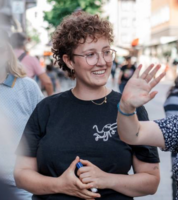
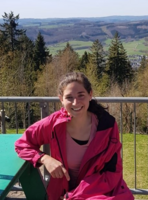
Psychologists for Future is a network of psychologists and psychotherapists who use their expertise to address the climate crisis and promote a sustainable future. This includes promoting awareness of the climate crisis, dealing with it emotionally and taking constructive action to deal with it, as well as supporting climate activists and groups.
Julika is doing her apprenticeship to become a psychotherapist for children and is currently working in a psychotherapeutic practice in Iphofen. She is a member of the german network „Psychologists for Future“
Paula is a psychotherapist, but mainly works as a research associate at Uniklinikum (University hospital) Würzburg. She is member and facilitator of the german network "Psychologists for future“.
Amelie R
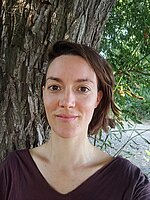
Amelie has been working in the social sector and with people in crisis situations for decades - e.g. in child and adolescent psychiatry and helping refugees. For several years now, she has been accompanying people in the extracurricular education sector on topics like climate justice, education for sustainable development and sustainable activism.
Here, her focus is on experience-based learning and bodywork as well as working with the land to strengthen the connection and relationship between us humans and our environment. In bodywork, she draws on approaches from body-oriented trauma therapy, neurosensitive & trauma-sensitive skills and generative somatics.
Generative somatics supports social and climate justice movements in achieving their visions of a radically transformed society. It engages the body (emotions, sensations, physiology), in order to align our actions with values and vision. And generative somatics includes aspects of politicized bodywork and embodied transformation for individual and systemic trauma. This can regulate the effects of trauma and oppression and support the development of embodied skills that increase our power in the fight for and building a transformed, sustainable world.
Jörg Schmid

Dr. Jörg Schmid is a medical doctor and planetary health advocate from Munich, Germany. In his clinical work he puts climate sensitive health counselling into practice, his major interest lies in the potential of plant based diets for the health of people and planet.
Eva-Maria Schwienhorst-Stich

Dr. med. Eva-Maria Schwienhorst-Stich is a medical doctor with previous clinical experience in pediatrics and "tropical medicine"/infectious diseases for several years. She has obtained a Diploma in Tropical Medicine and Public Health (DTMPH) from Charité and a Masters in International Health (MScIH) from Heidelberg University. She has worked for several years as a global health consultant for the German Leprosy and TB Relief Association (DAHW/GLRA) based in the headquarters in Germany with field visits to various countries in Asia, Africa, and Latin America. She has been teaching on global health topics at various universities and ran a summer school on tropical medicine and global health at Medmissio in Würzburg for several years. She used tob e head of the medical skills lab at Würzburg University medical faculty for the past three years and just finished her Masters in Medical Education (MME). After having learned about the dramatic extent and the urgency regarding the triple planetary crisis - climate change, biodiversity loss and pollution - her current focus is advancing planetary health education and action locally, nationally and internationally, the latter through the SOPHEA project. Apart from being a "scientivist", she is a mother of three daughters and deeply concerned about how our actions today determine the future living conditions on our planet earth.
August Stich

Professor Dr. August Stich is an MD and specialist in general, internal and tropical medicine. In 1992 he qualified as Master of Science at the London School of Hygiene and Tropical Medicine and worked afterwards in Würzburg, Liverpool and Heidelberg. In the years between 1988 and 2004 he had various assignments to tropical countries as medical doctor, health coordinator, advisor or research fellow, among others Zimbabwe, Somalia, Cambodia, Angola and Tanzania. His research work had a special focus on human African trypanosomiasis, malaria, HIV, clinical tropical medicine and migrant health. Since 2004 he is the head of the Department of Tropical Medicine in the Medical Mission Hospital in Würzburg. Since 2008 he is also the chairman of the Medical Mission Institute, since 2009 member of the extended board of the German Society of Tropical Medicine and Global Health and since 2022 member of the Supervisory Board of the German Leprosy and Tuberculosis Relief Association. In 2012 he was appointed Professor of Tropical Medicine at the University of Würzburg, in 2015 he was awarded the Albert Kölliker Price of excellent teaching. He currently lives with his family near Würzburg.
Ties Temmink
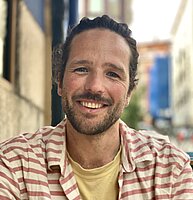
Ties Temmink is an agronomist and compost maker who works in the field of regenerative agriculture. He has an academic background in Environmental Sciences and Hydrology. His interest in soil and the potential of regenerative agriculture as a climate mitigation practise was sparked after years of climate activism during a period of visiting several farming projects in Europe. In 2020 he started an association that collaborates with farmers on the implementation of regenerative practises, inspired by the findings of the rapidly unfolding and fascinating field of soil microbiology. The association is an active member in the growing regenerative agriculture movement in the Netherlands and aims at knowledge transfer and sharing.
Remco Van de Pas
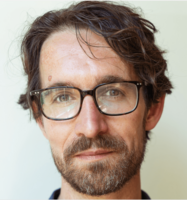
Dr. Remco van de Pas is the Research Lead for the Climate Justice and Determinants of Health workpackage at the United Nations University’s International Institute for Global Health (UNU-IIGH).
Dr. Remco van de Pas is a public health doctor and an interdisciplinary global health researcher with 20 years of experience in public health practice and international cooperation, global health policy and academia.
His work focuses on health systems governance, climate crisis, post-growth economics and foreign policy. He has expertise in health workforce development, social protection and health financing, epidemic governance, climate policy, social and ecological determinants of health, human rights and justice, globalization and its political-economy.
Prior to joining UNU he was a research associate at the Centre for Planetary Health Policy in Berlin and Clingendael, Netherlands Institute of International Relations. He worked as a global health lecturer and researcher at the Institute of Tropical Medicine Antwerp, Maastricht University and SciencesPo. Before this, he held positions in civil society and the NGO sector (Wemos, Doctors of the World, People’s Health Movement). Remco practiced medicine in mental health services for refugees and migrants.
Julia Weimert
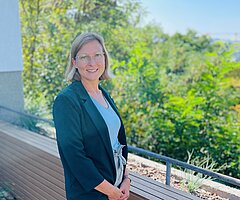
Julia Weimert is a lawyer and health economist (MBA) and has been head of the Sustainability Unit at the University Hospital Würzburg since March 2023. In addition to implementing the regulatory requirements for sustainability reporting, she and her colleague are responsible for coordinating sustainability projects at the hospital. They are also responsible for developing a sustainability strategy for the hospital. The inclusion of volunteer employees is also a concern of hers. By founding a Green Team at the University Hospital and addressing new employees directly at the induction day, ideas from everyday work are integrated directly into the work of the Sustainability Unit.






